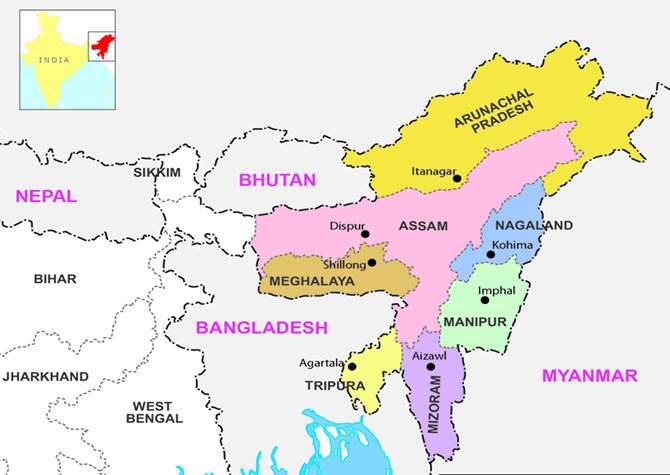Description

Copyright infringement not intended
Context: Nagaland's government has decided to repeal the Nagaland Municipal Act of 2001. As a result, the State Election Commission's notification to hold elections to Nagaland's 39 urban local bodies (ULBs) with 33% of the seats designated for women was cancelled. The court, however, blocked the notification cancelling the local body elections.
Details
- The Nagaland Government preferred to be in contempt of the Supreme Court by repealing the Nagaland Municipal Act of 2001 than face the anger of community-based organisations.
- The majority of traditional tribal and urban organisations are opposed to the 33% quota of seats for women, claiming that it would violate Nagaland's special provisions under Article 371A of the Constitution.

Why is there opposition to ULB polls?
- Nagaland is the only state where ULB seats are not reserved for women, as required by clause IV of the 74th Amendment to the Indian Constitution.
- The majority of traditional tribal and urban organisations reject the 33% allocation of seats for women, claiming that it would violate Nagaland's special provisions under Article 371A of the Constitution.
- The Article specifies that no Act of Parliament shall apply to Naga religious or social practises, Naga customary law and process, civil and criminal justice administration including Naga customary law rulings, or ownership and transfer of land and its resources.
- The hohos (apex tribal bodies) stress that women have long been excluded from decision-making bodies.
Background
- Nagaland had its first and only civic body election in 2004, with no seats reserved for women.
- In 2006, the state government revised the 2001 Municipal Act to add a 33% reserve for women, under the 74th Amendment. This provoked tremendous criticism, prompting the government to postpone the ULB elections in 2009 indefinitely.
- Attempts to hold elections in 2012 faced enormous opposition, and the State Assembly issued a resolution exempting Nagaland from Article 243T of the Constitution, which deals with women's reservation.
- In 2016, elections to civic bodies with a 33% reservation were announced. The notification caused significant chaos in which 2 people were killed.
Recent Steps
- Under pressure from the Supreme Court, the government agreed to hold ULB elections in March 2022 after consulting with diverse parties such as churches, NGOs, and tribal organisations.
- The tribal groups and civil society organisations have threatened to boycott the votes until the "borrowed" Municipal Act of 2001, which includes women's reservations, is "reviewed and rewritten in complete alignment with the voice of the Naga people" and does not violate Article 371A.
- The government surrendered to public pressure and abolished the Municipal Act with immediate effect, stating that the people "cannot be compelled" to vote in elections.

Article 371 A
About
- Article 371 A of the Indian Constitution is a special provision that grants a high degree of autonomy and self-governance to the state of Nagaland.
- It was inserted into the Constitution by the 13th Amendment Act, 1962, following a 16-point agreement between the Centre and the Naga People’s Convention in 1960, which led to the creation of Nagaland as a separate state in 1963.
Main Provisions of Article 371 A
- No Act of Parliament in respect of religious or social practices of the Nagas, Naga customary law and procedure, administration of civil and criminal justice involving decisions according to Naga customary law, and ownership and transfer of land and its resources, shall apply to Nagaland unless the state Assembly decides by a resolution to do so.
- Role of Governor: The Governor shall have special responsibility concerning law and order in the state for as long as internal disturbances continue therein or in any part thereof, and he shall exercise his judgment in this matter after consulting the Council of Ministers.
- The Governor shall ensure that any money provided by the Government of India for any specific service or purpose is included in the demand for a grant relating to that service or purpose and not in any other demand.
- Regional Council: There shall be established a regional council for the Tuensang district, consisting of 35 members and the Governor shall make rules for its composition and functioning.
- The regional council shall have powers concerning making laws on certain matters such as land, forests, fisheries, village administration, inheritance of property, marriage and divorce, social customs etc., within the Tuensang district.
Objectives
- To protect and preserve the unique identity, culture, traditions and customs of the Naga people, who have a long history of resistance and struggle against colonial and central domination.
- To foster peace and stability in the region, this has witnessed decades of insurgency and violence.
- Recognizes the diversity and plurality within Nagaland, by giving special status to the Tuensang district, which has a different ethnic composition from the rest of the state.
Significance
- It gives Nagaland a greater degree of autonomy and self-governance than any other state in India.
- It safeguards the rights and interests of the Naga people over their land and resources, which are crucial for their economic development and cultural survival.
- It enables people to maintain their distinct identity and way of life while being part of the Indian Union.
Concerns
- It restricts the scope and applicability of some progressive and beneficial laws enacted by Parliament, such as those related to women’s rights, child rights, environmental protection etc., unless they are adopted by the state Assembly.
- It creates difficulties in implementing some central schemes and policies that require uniformity and coordination across states.
- It raises questions about the compatibility and harmonization of Naga customary law with modern constitutional principles and human rights norms.

Conclusion
- Article 371 A is a unique and special provision that reflects the historical, political and cultural realities of Nagaland. It is an example of how federalism and diversity can be accommodated within a constitutional framework. It is also an expression of respect and recognition for the aspirations and sentiments of the Naga people.
- However, it also requires constant dialogue and consultation between the Centre and the state, as well as among various stakeholders within Nagaland, to ensure its effective implementation and adaptation to changing times.
Way Forward
- No municipal elections have been held in Nagaland after 2024. The ULBs remain defunct and without elected representatives. The state government has been managing the affairs of the ULBs through administrators appointed by it.
- The issue of municipal elections and women's reservations remains unresolved and contentious in Nagaland. While some sections of society support the democratic rights of urban citizens and women's empowerment, others oppose any change in their traditional norms and values.
- The challenge lies in finding a balance between constitutional provisions and customary laws and ensuring the peaceful and inclusive development of urban areas in Nagaland.
Must Read Articles:
Nagaland Issue: https://www.iasgyan.in/daily-current-affairs/nagaland-issue
Nagaland statehood day: https://www.iasgyan.in/daily-current-affairs/nagaland-statehood-day
|
PRACTICE QUESTION
Q. What was the historical agreement that led to the insertion of Article 371A for Nagaland in the Constitution of India?
a) Shillong Accord
b) Naga Peace Accord
c) 16-point Agreement
d) Mizo Accord
Answer: C
|
-min.jpg)
https://epaper.thehindu.com/ccidist-ws/th/th_delhi/issues/33047/OPS/GRPB4KS3N.1+GA1B4L6PN.1.html











